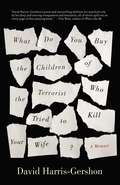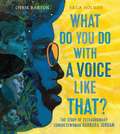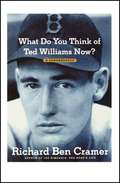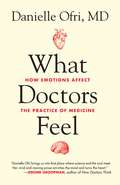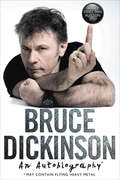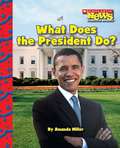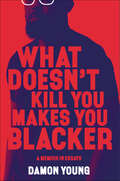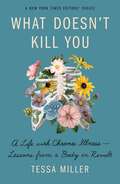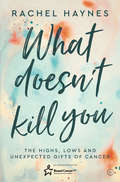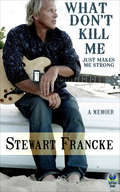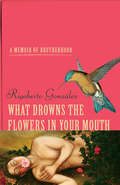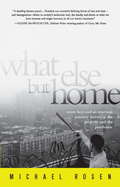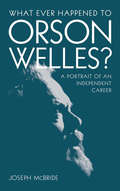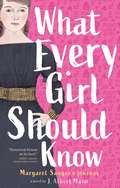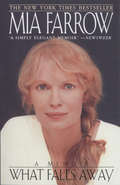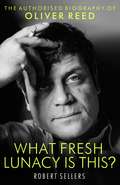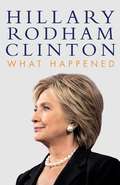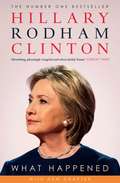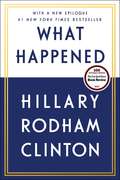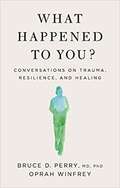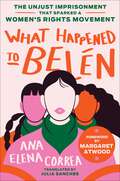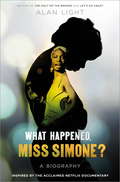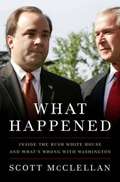- Table View
- List View
What Do You Buy the Children of the Terrorist Who Tried to Kill Your Wife? A Memoir: A Memoir
by David Harris-GershonDavid Harris-Gershon and his wife, Jamie, moved to Jerusalem full of hope. Then, in the midst of a historic cease-fire between Israel and the Palestinians, a bomb shrieked through Hebrew University’s cafeteria. Jamie was hurled across the room, her body burned and sliced with shrapnel; the friends sitting next to her were instantly killed. David was desperate for answers—why now? why here? why my wife? But when a doctor handed him some shrapnel removed from Jamie’s body, he refused to accept that this bit of metal made him “one of us”—another traumatized victim who would never be able to move on. Instead, he dug into Israeli government records to uncover what triggered the attack, then returned to East Jerusalem to meet the terrorist and his family. <P><P> Part memoir, part political thriller, part exposé of the conduct of the peace process, this fearless debut confronts the personal costs of the Middle East conflict—and reveals the human capacity for recovery and reconciliation, no matter the circumstance.
What Do You Do With a Voice Like That: The Story Of Congresswoman Barbara Jordan
by Chris BartonBarbara Jordan’s inspirational story from school to the House of Representatives to becoming a much loved teacher is told in this book.
What Do You Think of Ted Williams Now?: A Remembrance
by Richard Ben CramerRichard Ben Cramer, Pulitzer Prize winner and acclaimed biographer of Joe DiMaggio decodes baseball icon Ted Williams and finds not just a great player, but also a great man.When legendary Red Sox hitter Ted Williams died on July 5, 2002, newspapers reviewed the stats, compared him to other legends of the game, and declared him the greatest hitter who ever lived. In 1986, Richard Ben Cramer spent months on a profile of Ted Williams, and the result was the Esquire article that has been acclaimed ever since as one of the finest pieces of sports reporting ever written. Given special acknowledgment in The Best American Sportswriting of the Century and adapted for a coffee-table book called Ted Williams: The Seasons of the Kid, the original piece is now available in this special edition, with new material about Williams's later years. While his decades after Fenway Park were out of the spotlight -- the way Ted preferred it -- they were arguably his richest, as he loved and inspired his family, his fans, the players, and the game itself. This is a remembrance for the ages.
What Doctors Feel
by Danielle OfriA look at the emotional side of medicine--the shame, fear, anger, anxiety, empathy, and even love that affect patient care Physicians are assumed to be objective, rational beings, easily able to detach as they guide patients and families through some of life's most challenging moments. But doctors' emotional responses to the life-and-death dramas of everyday practice have a profound impact on medical care. And while much has been written about the minds and methods of the medical professionals who save our lives, precious little has been said about their emotions. In What Doctors Feel, Dr. Danielle Ofri has taken on the task of dissecting the hidden emotional responses of doctors, and how these directly influence patients. How do the stresses of medical life--from paperwork to grueling hours to lawsuits to facing death--affect the medical care that doctors can offer their patients? Digging deep into the lives of doctors, Ofri examines the daunting range of emotions--shame, anger, empathy, frustration, hope, pride, occasionally despair, and sometimes even love--that permeate the contemporary doctor-patient connection. Drawing on scientific studies, including some surprising research, Dr. Danielle Ofri offers up an unflinching look at the impact of emotions on health care. With her renowned eye for dramatic detail, Dr. Ofri takes us into the swirling heart of patient care, telling stories of caregivers caught up and occasionally torn down by the whirlwind life of doctoring. She admits to the humiliation of an error that nearly killed one of her patients and her forever fear of making another. She mourns when a beloved patient is denied a heart transplant. She tells the riveting stories of an intern traumatized when she is forced to let a newborn die in her arms, and of a doctor whose daily glass of wine to handle the frustrations of the ER escalates into a destructive addiction. But doctors don't only feel fear, grief, and frustration. Ofri also reveals that doctors tell bad jokes about "toxic sock syndrome," cope through gallows humor, find hope in impossible situations, and surrender to ecstatic happiness when they triumph over illness. The stories here reveal the undeniable truth that emotions have a distinct effect on how doctors care for their patients. For both clinicians and patients, understanding what doctors feel can make all the difference in giving and getting the best medical care. Praise for Danielle Ofri "The world of patient and doctor exists in a special sacred space. Danielle Ofri brings us into that place where science and the soul meet. Her vivid and moving prose enriches the mind and turns the heart." --Jerome Groopman, author of How Doctors Think "Danielle Ofri is a finely gifted writer, a born storyteller as well as a born physician." --Oliver Sacks, author of Awakenings "Danielle Ofri ... is dogged, perceptive, unafraid, and willing to probe her own motives, as well as those of others. This is what it takes for a good physician to arrive at the truth, and these same qualities make her an essayist of the first order." --Abraham Verghese, author of Cutting for Stone "Danielle Ofri has so much to say about the remarkable intimacies between doctor and patient, about the bonds and the barriers, and above all about how doctors come to understand their powers and their limitations." --Perri Klass, MD, author of A Not Entirely Benign Procedure "Her writing tumbles forth with color and emotion. She demonstrates an ear for dialogue, a humility about the limits of her medical training, and an extraordinary capacity to be touched by human suffering." --Jan Gardner, Boston Globe From the Hardcover edition.
What Doctors Feel: How Emotions Affect the Practice of Medicine
by Danielle OfriA look at the emotional side of medicine—the shame, fear, anger, anxiety, empathy, and even love that affect patient care Physicians are assumed to be objective, rational beings, easily able to detach as they guide patients and families through some of life’s most challenging moments. But doctors’ emotional responses to the life-and-death dramas of everyday practice have a profound impact on medical care. And while much has been written about the minds and methods of the medical professionals who save our lives, precious little has been said about their emotions. In What Doctors Feel, Dr. Danielle Ofri has taken on the task of dissecting the hidden emotional responses of doctors, and how these directly influence patients. How do the stresses of medical life—from paperwork to grueling hours to lawsuits to facing death—affect the medical care that doctors can offer their patients? Digging deep into the lives of doctors, Ofri examines the daunting range of emotions—shame, anger, empathy, frustration, hope, pride, occasionally despair, and sometimes even love—that permeate the contemporary doctor-patient connection. Drawing on scientific studies, including some surprising research, Dr. Danielle Ofri offers up an unflinching look at the impact of emotions on health care. With her renowned eye for dramatic detail, Dr. Ofri takes us into the swirling heart of patient care, telling stories of caregivers caught up and occasionally torn down by the whirlwind life of doctoring. She admits to the humiliation of an error that nearly killed one of her patients and her forever fear of making another. She mourns when a beloved patient is denied a heart transplant. She tells the riveting stories of an intern traumatized when she is forced to let a newborn die in her arms, and of a doctor whose daily glass of wine to handle the frustrations of the ER escalates into a destructive addiction. But doctors don’t only feel fear, grief, and frustration. Ofri also reveals that doctors tell bad jokes about “toxic sock syndrome,” cope through gallows humor, find hope in impossible situations, and surrender to ecstatic happiness when they triumph over illness. The stories here reveal the undeniable truth that emotions have a distinct effect on how doctors care for their patients. For both clinicians and patients, understanding what doctors feel can make all the difference in giving and getting the best medical care.
What Does This Button Do?: An Autobiography
by Bruce DickinsonA New York Times–bestselling memoir by multifaceted lead vocalist of Iron Maiden, one of the most successful, influential, and enduring rock bands ever. Singer. Songwriter. Airline captain. Aviation entrepreneur. Motivational speaker. Beer brewer. Novelist. Radio presenter. Screenwriter. World-class fencer. Icon . . . All of these things and much more, Iron Maiden&’s legendary front man Bruce Dickinson is one of the most unique and interesting men in the world. In this long-awaited memoir, Bruce contemplates the rollercoaster of life, and recounts—in his uniquely polished voice—the explosive exploits of his eccentric British childhood, the meteoric rise of Maiden, summoning the powers of darkness, the philosophy of fencing, brutishly beautiful Boeings, and dismissing cancer like an uninvited guest. Bold, honest, intelligent, and funny, this long-awaited memoir captures the life, heart, and mind of a true rock god.
What Does the President Do? (Scholastic News Nonfiction Readers)
by Amanda MillerThe book takes a look at the things that the Presidents do as part of their job, where they work from, and what they do when they are not working.
What Doesn't Kill You Makes You Blacker: A Memoir in Essays
by Damon Young“A blazing memoir in essays” (Entertainment Weekly) that explores the ever-shifting definitions of what it means to be black (and a man) in America.An NPR Best Book of the YearA Washington Independent Review of Books Favorite of the YearA Finalist for the NAACP Image AwardA Finalist for the Hurston/Wright Legacy Award for NonfictionA Finalist for the Thurber Prize for American HumorLonglisted for the PEN/Diamonstein-Spielvogel Award for the Art of the EssayFor Damon Young, existing while black is an extreme sport. The act of possessing black skin while searching for space to breathe in America is enough to induce a ceaseless state of angst, where questions such as “How should I react here, as a Professional Black Person?” and “Will this white person’s potato salad kill me?” are forever relevant.Both a celebration of the idiosyncrasies and distinctions of blackness and a critique of white supremacy and how we define masculinity, What Doesn’t Kill You Makes You Blacker is a hilarious and honest debut that chronicles Young’s efforts to survive while battling and making sense of the various neuroses his country has given him.“Young delivers a passionate, wryly bittersweet tribute to Black life in majority-white Pittsburgh . . . A must read.” —Booklist (starred review)“Young’s charm and wit make these essays a pleasure to read; his candid approach makes them memorable.” —Publishers Weekly (starred review)
What Doesn't Kill You: A Life with Chronic Illness - Lessons from a Body in Revolt
by Tessa Miller"Should be read by anyone with a body. . . . Relentlessly researched and undeniably smart."—The New York TimesWhat Doesn't Kill You is the riveting account of a young journalist’s awakening to chronic illness, weaving together personal story and reporting to shed light on living with an ailment forever.Tessa Miller was an ambitious twentysomething writer in New York City when, on a random fall day, her stomach began to seize up. At first, she toughed it out through searing pain, taking sick days from work, unable to leave the bathroom or her bed. But when it became undeniable that something was seriously wrong, Miller gave in to family pressure and went to the hospital—beginning a years-long nightmare of procedures, misdiagnoses, and life-threatening infections. Once she was finally correctly diagnosed with Crohn’s disease, Miller faced another battle: accepting that she will never get better.Today, an astonishing three in five adults in the United States suffer from a chronic disease—a percentage expected to rise post-Covid. Whether the illness is arthritis, asthma, Crohn's, diabetes, endometriosis, multiple sclerosis, ulcerative colitis, or any other incurable illness, and whether the sufferer is a colleague, a loved one, or you, these diseases have an impact on just about every one of us. Yet there remains an air of shame and isolation about the topic of chronic sickness. Millions must endure these disorders not only physically but also emotionally, balancing the stress of relationships and work amid the ever-present threat of health complications.Miller segues seamlessly from her dramatic personal experiences into a frank look at the cultural realities (medical, occupational, social) inherent in receiving a lifetime diagnosis. She offers hard-earned wisdom, solidarity, and an ultimately surprising promise of joy for those trying to make sense of it all.
What Doesn't Kill You: The Highs, Lows and Unexpected Gifts of Surviving Cancer
by Rachel HaynesRachel Haynes survived bowel cancer, not once, but twice. There have been many unexpected consequences … this is her story. Exploring the ups and downs of treatment with sensitivity, humour and brutal honesty, Rachel reflects on the psychological impacts of survival not only on herself but on those who have supported her. Being diagnosed with stage 4 bowel cancer while bringing up two growing children, holding down a full time job, going through a break-up and having three days to adjust to a life-changing operation is far from ideal. Add to this a short period of remission, a new relationship, followed by an unexpected relapse and the whole thing starting again, and you know you are going to be in for an interesting read.
What Don't Kill Me Just Makes Me Strong: A Memoir
by Stewart FranckeThe Detroit music legend and founder of the Stewart Francke Leukemia Foundation shares his inspiring story of illness, faith, and the drive to survive. In this candid survival memoir, Stewart Francke recounts his remarkable journey with leukemia through a bone marrow transplant, complications, and eventual recovery. Understanding that his survival makes him part of the &“lucky unlucky,&” the young father and renowned musician finds the silver lining—and then some—in his struggle. Francke&’s story from initial biopsy to full recovery is often harrowing. Yet it is in the darkest moments that he learns important lessons about survival. Coming to understand that faith is a choice, he also realizes that only death is irrevocable. All else either makes us stronger or becomes part of the gift of life. Beginning each chapter with a brief but powerful lesson in living, Francke&’s singular story of illness, faith, and family is also a universal guide for facing adversity.
What Drowns the Flowers in Your Mouth: A Memoir of Brotherhood (Living Out: Gay and Lesbian Autobiog)
by Rigoberto GonzálezBurdened by poverty, illiteracy, and vulnerability as Mexican immigrants to California's Coachella Valley, three generations of González men turn to vices or withdraw into depression. As brothers Rigoberto and Alex grow to manhood, they are haunted by the traumas of their mother's early death, their lonely youth, their father's desertion, and their grandfather's invective. Rigoberto's success in escaping—first to college and then by becoming a writer—is blighted by his struggles with alcohol and abusive relationships, while Alex contends with difficult family relations, his own rocky marriage, and fatherhood. Descending into a dark emotional space that compromises their mental and physical health, the brothers eventually find hope in aiding each other. This is an honest and revealing window into the complexities of Latino masculinity, the private lives of men, and the ways they build strength under the weight of grief, loss, and despair.
What Else But Home: Seven Boys and an American Journey Between the Projects and the Penthouse
by Michael RosenA compelling story of one familyOCOs journey across the divide of race, class, and economic opportunity in America through love and baseball"
What Ever Happened to Orson Welles?: A Portrait of an Independent Career
by Joseph McBrideA &“personal and passionate&” account of the Citizen Kane director&’s years as an expatriate and self-funded filmmaker (Los Angeles Times). At twenty-five, Orson Welles directed, co-wrote, and starred in Citizen Kane, widely considered the best film ever made. But Welles was such a revolutionary filmmaker that he found himself at odds with the Hollywood studio system, and his work was so far ahead of its time that he never regained the popular following he once enjoyed. Frustrated by Hollywood and falling victim to the postwar blacklist, Welles left for a long European exile. But he kept making films, functioning with the creative freedom of an independent filmmaker before that term became common and eventually preserving his independence by funding virtually all his own projects. Because he worked defiantly outside the system, Welles has often been maligned as an errant genius who squandered his early promise. Film critic Joseph McBride, who acted in Welles&’s unfinished film The Other Side of the Wind, challenges conventional wisdom about Welles&’s supposed creative decline in this first comprehensive examination of the films of Welles&’s artistically rich yet little-known later period. During the 1970s and &’80s, Welles was breaking new aesthetic ground, experimenting as adventurously as he had throughout his career. McBride&’s friendship and collaboration with Welles and his interviews with those who knew and worked with him make What Ever Happened to Orson Welles? a portrait of rare intimacy and insight. Reassessing Welles&’s final period in the context of his entire life and work, this revealing portrait of this great film artist will change the terms of how Orson Welles is regarded. &“[An] anecdote-illuminated account of Welles&’s later years.&” —The Washington Post &“Joseph McBride. . .has a clearer understanding of Welles and his films than almost anyone.&” —Martin Scorsese &“A definitive study.&” —Milwaukee Journal Sentinel
What Every Girl Should Know: Margaret Sanger's Journey
by J. Albert MannThis compelling historical novel spans the early and very formative years of feminist and women’s health activist Margaret Sanger, founder of Planned Parenthood, as she struggles to find her way amidst the harsh realities of poverty. <P><P>Margaret was determined to get out. She didn’t want to clean the dirty dishes and soiled diapers that piled up day in and day out in her large family’s small home. She didn’t want to disappoint her ailing mother, who cared tirelessly for an ever-growing number of children despite her incessant cough. And Margaret certainly didn’t want to be labeled a girl of “promise,” destined to become either a teacher or a mother—which seemed to be a woman’s only options. As a feisty and opinionated young woman, Margaret Higgins Sanger witnessed and experienced incredible hardships, which led to her groundbreaking work as an advocate for women’s rights and the founder of Planned Parenthood. <P><P>This fiery novel of Margaret’s early life paints the portrait of a young woman with the passion and courage to change the world.
What Falls Away: A Memoir
by Mia FarrowIn an exquisitely written memoir, Mia Farrow introduces us to the landscapes of her extraordinary life. Moving from her earliest memories of the walled gardens and rocky shores of western Ireland and her Hollywood childhood to her career as an actress, she writes of these experiences and her struggle to protect her children in a painful custody battle with Woody Allen. It was this crisis that led her to reflect upon the incidents that had brought her to a place so incomprehensible. Now, in What Falls Away, a memoir resonant not only in its honesty but also in its beautifully crafted prose, Mia Farrow speaks for the first time.She was born the third of seven children to the beautiful actress Maureen O'Sullivan and successful writer/director John Farrow, but the isolation of a polio ward brought her childhood to an abrupt end at the age of nine. Several years later, two deaths shattered the security of the family forever, and Mia Farrow embarked upon a journey that would lead her away from the convent education that was to sustain her spiritual courage, to starring roles in Peyton Place and Rosemary's Baby, a marriage to Frank Sinatra, divorce, a defining trip to India, work on the London stage and in film, and marriage to André Previn. Their life together in England brought them three sons and three daughters before that marriage, too, dissolved and she returned to the United States.The year 1979 saw the beginning of a new career with brilliant performances in thirteen of Woody Allen's most distinguished films.Told with grace and deep understanding, as well as humor, What Falls Away goes beneath the surface of this amazing life, with all its drama, success, and pain, and exposes the inner workings of a mind and spirit for whom truth, compassion, and faith are essential.Mia Farrow's story is ultimately one of hope and courage in the face of difficulty; of commitment to others--most important of whom are her children; and of spiritual strength. Readers will not easily forget this remarkable book, even long after the last page has been turned.
What Fresh Lunacy is This?: The Authorized Biography of Oliver Reed
by Robert SellersOliver Reed may not have been Britain's biggest film star - for a period in the early 70s he came within a hairsbreadth of replacing Sean Connery as James Bond - but he is an august member of that small band of people, like George Best and Eric Morecambe, who transcended their chosen medium, became too big for it even, and grew into cultural icons. For the first time Reed's close family has agreed to collaborate on a project about the man himself. The result is a fascinating new insight into a man seen by many as merely a brawling, boozing hellraiser. And yet he was so much more than this. For behind that image, which all too often he played up to in public, was a vastly complex individual, a man of deep passions and loyalty but also deep-rooted vulnerability and insecurities. Why was a proud, patriotic, intelligent, successful and erudite man so obsessed about proving himself to others, time and time again?Although the Reed myth is of Homeric proportions, he remains a national treasure and somewhat peculiar icon.
What Fresh Lunacy is This?: The Authorized Biography of Oliver Reed
by Robert SellersOliver Reed may not have been Britain's biggest film star - for a period in the early 70s he came within a hairsbreadth of replacing Sean Connery as James Bond - but he is an august member of that small band of people, like George Best and Eric Morecambe, who transcended their chosen medium, became too big for it even, and grew into cultural icons.For the first time Reed's close family has agreed to collaborate on a project about the man himself. The result is a fascinating new insight into a man seen by many as merely a brawling, boozing hellraiser. And yet he was so much more than this. For behind that image, which all too often he played up to in public, was a vastly complex individual, a man of deep passions and loyalty but also deep-rooted vulnerability and insecurities. Why was a proud, patriotic, intelligent, successful and erudite man so obsessed about proving himself to others, time and time again?Although the Reed myth is of Homeric proportions, he remains a national treasure and somewhat peculiar icon.Praise for other books by Robert Sellers:Hellraisers: The Life and Inebriated Times of Richard Burton, Richard Harris, Peter O'Toole, and Oliver Reed: 'So wonderfully captures the wanton belligerence of both binging and stardom you almost feel the guys themselves are telling the tales.' GQ.Vic Armstrong: The True Adventures of the World's Greatest Stuntman:'This is the best and most original behind-the-scenes book I have read in years, gripping and revealing.' Roger Lewis, Daily Mail.Don't Let the Bastards Grind You Down: '...a rollicking good read... Sellers has done well to capture a vivid snapshot of this exciting time.' Lynn Barber, Sunday Times.
What Happened
by Hillary ClintonFor the first time, Hillary Rodham Clinton reveals what she was thinking and feeling during one of the most controversial and unpredictable presidential elections in history. Now free from the constraints of running, Hillary takes you inside the intense personal experience of becoming the first woman nominated for president by a major party in an election marked by rage, sexism, exhilarating highs and infuriating lows, stranger-than-fiction twists, Russian interference, and an opponent who broke all the rules. This is her most personal memoir yet. In these pages, she describes what it was like to run against Donald Trump, the mistakes she made, how she has coped with a shocking and devastating loss, and how she found the strength to pick herself back up afterward. With humor and candor, she tells readers what it took to get back on her feet—the rituals, relationships, and reading that got her through, and what the experience has taught her about life. She speaks about the challenges of being a strong woman in the public eye, the criticism over her voice, age, and appearance, and the double standard confronting women in politics. She lays out how the 2016 election was marked by an unprecedented assault on our democracy by a foreign adversary. By analyzing the evidence and connecting the dots, Hillary shows just how dangerous the forces are that shaped the outcome, and why Americans need to understand them to protect our values and our democracy in the future. The election of 2016 was unprecedented and historic. What Happened is the story of that campaign and its aftermath—both a deeply intimate account and a cautionary tale for the nation.
What Happened
by Hillary Clinton'In the past, for reasons I try to explain, I’ve often felt I had to be careful in public, like I was up on a wire without a net. Now I’m letting my guard down.' - Hillary Rodham Clinton, from the introduction of What Happened For the first time, Hillary Rodham Clinton reveals what she was thinking and feeling during one of the most controversial and unpredictable presidential elections in history. Now free from the constraints of running, Hillary takes you inside the intense personal experience of becoming the first woman nominated for president by a major party in an election marked by rage, sexism, exhilarating highs and infuriating lows, stranger-than-fiction twists, Russian interference and an opponent who broke all the rules. This is her most personal memoir yet. In these pages, she describes what it was like to run against Donald Trump, the mistakes she made, how she has coped with a shocking and devastating loss, and how she found the strength to pick herself back up afterwards. With humour and candour, she tells readers what it took to get back on her feet - the rituals, relationships and reading that got her through, and what the experience has taught her about life. She speaks about the challenges of being a strong woman in the public eye, the criticism over her voice, age and appearance, and the double standard confronting women in politics. She lays out how the 2016 election was marked by an unprecedented assault on democracy by a foreign adversary. By analysing the evidence and connecting the dots, Hillary shows just how dangerous the forces are that shaped the outcome, and why Americans need to understand them to protect their values and democracy in the future. The election of 2016 was unprecedented and historic. What Happened is the story of that campaign and its aftermath - both a deeply intimate account and a cautionary tale.
What Happened
by Hillary Clinton<P>“In the past, for reasons I try to explain, I’ve often felt I had to be careful in public, like I was up on a wire without a net. Now I’m letting my guard down.” —Hillary Rodham Clinton, from the introduction of What Happened <P>For the first time, Hillary Rodham Clinton reveals what she was thinking and feeling during one of the most controversial and unpredictable presidential elections in history. Now free from the constraints of running, Hillary takes you inside the intense personal experience of becoming the first woman nominated for president by a major party in an election marked by rage, sexism, exhilarating highs and infuriating lows, stranger-than-fiction twists, Russian interference, and an opponent who broke all the rules. <P>This is her most personal memoir yet. In these pages, she describes what it was like to run against Donald Trump, the mistakes she made, how she has coped with a shocking and devastating loss, and how she found the strength to pick herself back up afterward. With humor and candor, she tells readers what it took to get back on her feet—the rituals, relationships, and reading that got her through, and what the experience has taught her about life. <P>She speaks about the challenges of being a strong woman in the public eye, the criticism over her voice, age, and appearance, and the double standard confronting women in politics. She lays out how the 2016 election was marked by an unprecedented assault on our democracy by a foreign adversary. <P>By analyzing the evidence and connecting the dots, Hillary shows just how dangerous the forces are that shaped the outcome, and why Americans need to understand them to protect our values and our democracy in the future. The election of 2016 was unprecedented and historic. <P>What Happened is the story of that campaign and its aftermath—both a deeply intimate account and a cautionary tale for the nation. <P><b>A New York Times Bestseller</b>
What Happened To You?: Conversations On Trauma, Resilience, and Healing
by Oprah Winfrey Bruce D. PerryOur earliest experiences shape our lives far down the road, and What Happened to You? provides powerful scientific and emotional insights into the behavioral patterns so many of us struggle to understand. <p><p> Have you ever wondered "Why did I do that?" or "Why can't I just control my behavior?" Others may judge our reactions and think, "What's wrong with that person?" When questioning our emotions, it's easy to place the blame on ourselves; holding ourselves and those around us to an impossible standard. It's time we started asking a different question. <p><p> Through deeply personal conversations, Oprah Winfrey and renowned brain and trauma expert Dr. Bruce Perry offer a groundbreaking and profound shift from asking “What’s wrong with you?” to “What happened to you?” <p><p> Here, Winfrey shares stories from her own past, understanding through experience the vulnerability that comes from facing trauma and adversity at a young age. In conversation throughout the book, she and Dr. Perry focus on understanding people, behavior, and ourselves. It’s a subtle but profound shift in our approach to trauma, and it’s one that allows us to understand our pasts in order to clear a path to our future―opening the door to resilience and healing in a proven, powerful
What Happened to Belén: The Unjust Imprisonment That Sparked a Women's Rights Movement
by Ana Elena Correa"There are many women like Belén whose names we don’t know, but whose stories are just as important. An uplifting chronicle of one woman’s fight for justice."—Kirkus Reviews (starred review)Foreword by Margaret AtwoodThe heartbreaking true story of an Argentinian woman imprisoned for having a miscarriage—an injustice that galvanized a feminist movement and became a global rallying cry in the fight for reproductive rights.In 2014, Belén, a twenty-five-year-old woman living in rural Argentina, went to the hospital for a stomachache—and soon found herself in prison. While at the hospital she had a miscarriage—without knowing she was pregnant. Because of the nation’s repressive laws surrounding abortion and reproductive rights, the doctors were forced to report her to the authorities. Despite her protestations, Belén was convicted and sentenced to two years for homicide.Belén’s imprisonment is a glaring example of how women’s health care has become increasingly criminalized, putting the most vulnerable—BIPOC, rural, and low-income—women at greater risk of prosecution. Belén’s cause became the centerpiece of a movement to achieve greater protections for all women. After two failed attempts to clear her name, Belén met feminist lawyer Soledad Deza, who quickly rallied Amnesty International and ignited an international feminist movement around #niunamas—not one more—symbolized by thousands of demonstrators around the globe donning white masks, the same kind of mask Belén wore when leaving prison. The #niunamas movement was instrumental in pressuring Argentine president Alberto Fernández to decriminalize abortion in 2021. In this gripping and personal account of the case and its impact on local law, Ana Correa, one of Argentina’s leading journalists and activists, makes clear that what happened to Belén could happen to any woman—and that we all have the power to raise our collective voices and demand change.Translated by Julia Sanches
What Happened, Miss Simone?
by Alan LightInspired by the critically acclaimed Netflix documentary What Happened, Miss Simone?, an intimate and vivid look at the legendary life of Nina Simone, the classically trained pianist who evolved into a chart-topping chanteuse and committed civil rights activist. From music journalist and former Spin and Vibe editor-in-chief Alan Light comes a biography of incandescent soul singer and Black Power icon Nina Simone, one of the most influential, provocative, and least understood artists of our time. Drawn from a trove of rare archival footage, audio recordings and interviews (including Simone's remarkable private diaries), this nuanced examination of Nina Simone's life highlights her musical inventiveness and unwavering quest for equality, while laying bare the personal demons that plagued her from the time of her Jim Crow childhood in North Carolina to her self-imposed exile in Liberia and Paris later in life. Harnessing the singular voice of Miss Simone herself and incorporating candid reflections from those who knew her best, including her only daughter, Light brings us face to face with a legend, examining the very public persona and very private struggles of one of our greatest artists.From the Hardcover edition.
What Happened: Inside the Bush White House and Washington's Culture of Deception
by Scott McclellanBush's former press secretary describes what happened to take the presidency he served disastrously and irretrievably off course.
